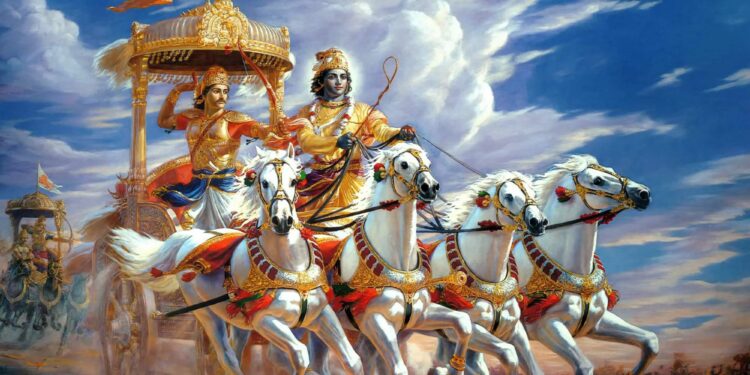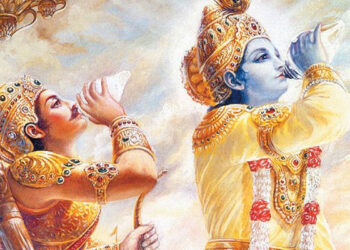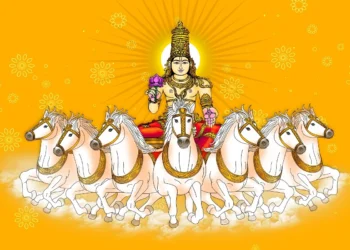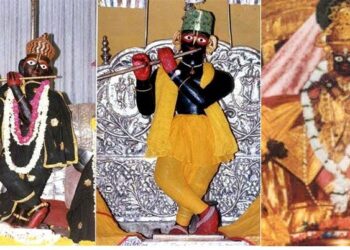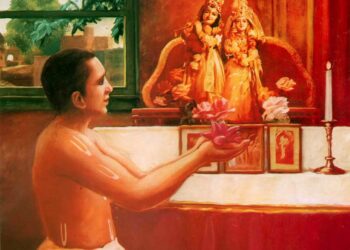TEXT 26
na buddhi-bhedaṁ janayed
ajñānāṁ karma-saṅginām
joṣayet sarva-karmāṇi
vidvān yuktaḥ samācaran
SYNONYMS
na—not; buddhi—bhedam—disruption of intelligence; janayet—he should cause; ajñānām—of the foolish; karma-saṅginām—who are attached to fruitive work; joṣayet—he should dovetail; sarva—all; karmāṇi—work; vidvān—a learned person; yuktaḥ—engaged; samācaran—practicing.
TRANSLATION
So as not to disrupt the minds of ignorant men attached to the fruitive results of prescribed duties, a learned person should not induce them to stop work. Rather, by working in the spirit of devotion, he should engage them in all sorts of activities [for the gradual development of Kṛṣṇa consciousness].
PURPORT
Vedaiś ca sarvair aham eva vedyaḥ. That is the end of all Vedic rituals. All rituals, all performances of sacrifices, and everything that is put into the Vedas, including all direction for material activities, are meant for understanding Kṛṣṇa, who is the ultimate goal of life. But because the conditioned souls do not know anything beyond sense gratification, they study the Vedas to that end. But through fruitive activities and sense gratification regulated by the Vedic rituals one is gradually elevated to Kṛṣṇa consciousness. Therefore a realized soul in Kṛṣṇa consciousness should not disturb others in their activities or understanding, but he should act by showing how the results of all work can be dedicated to the service of Kṛṣṇa. The learned Kṛṣṇa conscious person may act in such a way that the ignorant person working for sense gratification may learn how to act and how to behave. Although the ignorant man is not to be disturbed in his activities, a slightly developed Kṛṣṇa conscious person may directly be engaged in the service of the Lord without waiting for other Vedic formulas. For this fortunate man there is no need to follow the Vedic rituals, because by direct Kṛṣṇa consciousness one can have all the results one would otherwise derive from following one’s prescribed duties.
TEXT 27
prakṛteḥ kriyamāṇāni
guṇaiḥ karmāṇi sarvaśaḥ
ahaṅkāra-vimūḍhātmā
kartāham iti manyate
SYNONYMS
prakṛteḥ—of material nature; kriyamāṇāni—being done; guṇaiḥ—by the modes; karmāṇi—activities; sarvaśaḥ—all kinds of; ahaṅkāra-vimūḍha—bewildered by false ego; ātmā—the spirit soul; kartā—doer; aham—I; iti—thus; manyate—he thinks.
TRANSLATION
The spirit soul bewildered by the influence of false ego thinks himself the doer of activities that are in actuality carried out by the three modes of material nature.
PURPORT
Two persons, one in Kṛṣṇa consciousness and the other in material consciousness, working on the same level, may appear to be working on the same platform, but there is a wide gulf of difference in their respective positions. The person in material consciousness is convinced by false ego that he is the doer of everything. He does not know that the mechanism of the body is produced by material nature, which works under the supervision of the Supreme Lord. The materialistic person has no knowledge that ultimately he is under the control of Kṛṣṇa. The person in false ego takes all credit for doing everything independently, and that is the symptom of his nescience. He does not know that this gross and subtle body is the creation of material nature, under the order of the Supreme Personality of Godhead, and as such his bodily and mental activities should be engaged in the service of Kṛṣṇa, in Kṛṣṇa consciousness. The ignorant man forgets that the Supreme Personality of Godhead is known as Hṛṣīkeśa, or the master of the senses of the material body, for due to his long misuse of the senses in sense gratification, he is factually bewildered by the false ego, which makes him forget his eternal relationship with Kṛṣṇa.


